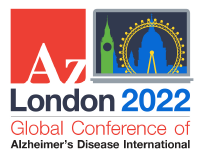Alzheimer's Disease International Conference
Dr. Arlene Astell presented some of her work at the 35th Global Conference of Alzheimer’s Disease International that took place from June 9-11. This year the conference was hosted in person in London, England with some presentations scheduled to be streamed online all of which featured keynote speakers as well as oral and poster presenters, whose talks reported on the latest advances in each of the 7 action areas of the World Health Organization’s (WHO’s) Global action plan on dementia.
Dr. Arlene Astell, Principal Investigator
Dr. Astell had some words to say regarding her attendance at the event.
This year’s conference, titled: “New horizons in dementia; Building on hope” was a hybrid conference, held in London, UK from 9th-11th June 2022. It was an absolute delight to be able to travel and meet people again after more than two years of the COVID-19 pandemic. Understandably the ADI conference was smaller than in previous years with many people still unable to travel or preferring not to take any risks. Those who did make it in person were treated to a range of cultural and creative activities, alongside research presentations and debate about the future of dementia care and interventions. The amazing Film and Arts programme, contributed by ADI members from around the world was a wonderful demonstration of the ability, resourcefulness and creativity of individuals living with dementia and those who support them.
Predictably the impact of COVID-19 featured quite prominently in discussions at ADI, including how the need to move to online service had produced some positive outcomes. For example, Melissa Chan from Dementia Singapore, presented CARA, a dementia membership programme combining a lifestyle and community digital platform and ecosystem of care and support. She reported how the introduction of a COVID app, had raised awareness of QR codes and made it easier for CARA to use a QR code to assist when people are unable to find their way home. More information about CARA can be found here.
I was very proud to speak alongside Melissa in the session “Innovation, entrepreneurship and technology” with two fellow speakers – Diana BlackWelder and Dr Mary Radnofksy from the USA – who are living with dementia. Diana and Mary described their experiences as co-researchers with Dr Emma Dixon exploring how people living with dementia seek digital health information. I presented our findings from the MCI@work project looking at how technology impacts people who develop dementia or Mild Cognitive Impairment whilst still working. This stimulated a lot of discussion between the audience and panel, with both Mary and Diana sharing their experiences of developing dementia in the workplace. In a parallel session fellow MCI@work team member, Dr Mervi Issakainen from the University of Eastern Finland, was delivering her presentation on “Resources and impediments for influencing one’s own life when living with younger onset dementia.” This completed a hattrick of MCI@work presentations with Dr Ann-Charlotte Nedlund, Linköping University presenting “Citizenship for employees living with dementia – how agents in the welfare system reason and act in the transition from work”, which was streamed on demand throughout the conference.



